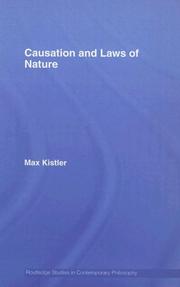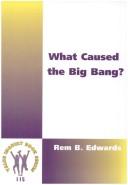| Listing 1 - 10 of 13 | << page >> |
Sort by
|
Book
ISBN: 6076282991 Year: 1942 Publisher: El Colegio de México
Abstract | Keywords | Export | Availability | Bookmark
 Loading...
Loading...Choose an application
- Reference Manager
- EndNote
- RefWorks (Direct export to RefWorks)
Contra la opinión de parte de la crítica, que ve en los escritos religiosos de DAVID HUME (1711-1776) mera curiosidad culturalista, o incluso irreverencia e ironía, el interés del pensador escocés por que sus Diálogos sobre la religión natural se vieran publicados aun después de su muerte desmiente que diera poca importancia a este tema. Si bien la actitud de Hume hacia la experiencia religiosa pudo ser escéptica, la indudable presencia en esta obra -como apunta en su prólogo Carlos Mellizo- de todos aquellos temas básicos presentes en todo sistema de ideas o creencias religiosas hacen de ella no sólo una indagación sobre la religión, sino también, en su dimensión estrictamente filosófica, uno de los pilares fundamentales del pensamiento moderno en torno al tema del teísmo especulativo
Book
ISBN: 1003184251 9781003184256 9781000449419 1000449416 9781000449433 1000449432 9781032020365 9781032026220 1032020369 Year: 2021 Publisher: New York, NY : Routledge,
Abstract | Keywords | Export | Availability | Bookmark
 Loading...
Loading...Choose an application
- Reference Manager
- EndNote
- RefWorks (Direct export to RefWorks)
"This book provides a reading of Newton's argument for universal gravity that is focused on the evidence-based, "experimental" reasoning that Newton associates with his program of experimental philosophy. It highlights the richness and complexity of the Principia and also draws important lessons about how to situate Newton in his natural philosophical context. The book has two primary objectives. First, it defends a novel interpretation of the third of Newton's four Rules for the Study of Natural Philosophy-what the author terms the Two-Set Reading of Rule 3. Second, it argues that this novel interpretation of Rule 3 sheds additional light on the differences between Newton's experimental philosophy and Descartes's "hypothetical philosophy," and that it also illuminates how the practice of experimental philosophy allowed Newton to make a universal force of gravity the centerpiece of his explanation of the system of the world. Newton's Third Rule and the Experimental Argument for Universal Gravity will be of interest to researchers and advanced students working on Newton's natural philosophy, early modern philosophy, and the history of science"-- Provided by publisher.
Philosophy of nature. --- Philosophy of nature --- History. --- Nature --- Nature, Philosophy of --- Natural theology --- Philosophy
Book
ISBN: 9189244117 Year: 2022 Publisher: [Place of publication not identified] : Kriterium,
Abstract | Keywords | Export | Availability | Bookmark
 Loading...
Loading...Choose an application
- Reference Manager
- EndNote
- RefWorks (Direct export to RefWorks)
Philosophy of nature. --- Place (Philosophy) --- Philosophy --- Nature --- Nature, Philosophy of --- Natural theology

ISBN: 9780415611183 0415398592 9780415398596 9780203966228 0415611180 1134150687 9786610553013 1280553014 0203966228 9781134150632 9781134150670 9781134150687 1134150679 Year: 2006 Volume: 2 Publisher: New York, NY : Routledge,
Abstract | Keywords | Export | Availability | Bookmark
 Loading...
Loading...Choose an application
- Reference Manager
- EndNote
- RefWorks (Direct export to RefWorks)
This is the first English translation of Causalite ́ et Lois de La Nature, and is an important contribution to the theory of causation. Max Kistler reconstructs a unified concept of causation that is general enough to adequately deal with both elementary physical processes, and the macroscopic level of phenomena we encounter in everyday life.This book will be of great interest to philosophers of science and metaphysics, and also to students and scholars of philosophy of mind where concepts of causation and law play a prominent role.
Causation. --- Philosophy of nature. --- Logic --- Natural law --- Nature --- Nature, Philosophy of --- Natural theology --- Causality --- Cause and effect --- Effect and cause --- Final cause --- Beginning --- God --- Metaphysics --- Philosophy --- Necessity (Philosophy) --- Teleology --- causal --- responsibility --- statements --- antecedent --- property --- relation --- eventive --- nomological --- statement --- theory
Book
ISBN: 9780615845562 Year: 2022 Publisher: New York : Punctum Books,
Abstract | Keywords | Export | Availability | Bookmark
 Loading...
Loading...Choose an application
- Reference Manager
- EndNote
- RefWorks (Direct export to RefWorks)
What is soul? Can it be forfeited? Can it be traded away? If it can, what would ensue? What consequences would follow from loss of soul - for the individual, for society, for the earth? In the early nineteenth century, Goethe's hero, Faust, became a defining archetype of modernity, a harbinger of the existential possibilities and moral complexities of the modern condition. But today the dire consequences of the Faustian pact with the devil are becoming alarmingly visible. In light of this, how would Goethe's arguably flawed drama play out in a 21st-century century setting? Would a contemporary Faust sign up to a demonic deal? Indeed what, in the wake of two hundred years of social and economic development, would be left for the devil to offer him? A contemporary Faust would already possess everything the original Faust in his ascetic cloister lacked - affluence and mobility; celebrity and worldly influence; access to information; religious choice; sexual freedom and the availability of women - though women, it must be noted, currently also partake of that same freedom. The only thing a present-day Faust would lack would be his soul. Would he miss it? Does soul even exist? If it does, it would of course be the one thing the devil could not bestow. So from what or whom could Faust retrieve it? What, in a word, would a contemporary Faust most deeply desire? In pursuit of these questions, Ardea engages a familiar but possibly faulty archetype, that of Faust, with an unfamiliar one, that of the white heron, an archetype borrowed from a short story of the same name by 19th-century American author, Sarah Orne Jewett. In Jewett's tale, a soul-pact of an entirely different kind from that entered into by Faust is proposed. It is a pact with the wild, a pledge of fealty, of non-forfeiture, that promises to redraw the violent psycho-sexual and psycho-spiritual patterns that have underpinned modernity. How would a present-day heir to the Faustian tradition, ingrained with the habit of entitlement but also burdened with the consequences of the old pact, respond to the new proposition?
Philosophy of nature. --- Philosophy. --- Ethics. --- Soul. --- Nature --- Nature, Philosophy of --- Natural theology --- Pneuma --- Future life --- Philosophical anthropology --- Theological anthropology --- Animism --- Spirit --- Deontology --- Ethics, Primitive --- Ethology --- Moral philosophy --- Morality --- Morals --- Philosophy, Moral --- Science, Moral --- Philosophy --- Values --- Mental philosophy --- Humanities
Book
ISBN: 9781950192083 Year: 2019 Publisher: Brooklyn, NY punctum books
Abstract | Keywords | Export | Availability | Bookmark
 Loading...
Loading...Choose an application
- Reference Manager
- EndNote
- RefWorks (Direct export to RefWorks)
Not all charms fly at the touch of cold philosophy. Vital Reenchantments examines so-called cold philosophy, or science, that does precisely the opposite — rather than mercilessly emptying out and unweaving, it operates as a philosophy that animates. More specifically, Greyson closely examines how a specific group of “poet-in-scientists” of the late 1970s and 1980s directed attention to the “wondrous” unfolding of life, at a time when the counter-culture in particular had made the institution of science synonymous with technologies of alienation and destruction. In this vein, Vital Reenchantments takes up E.O. Wilson’s Biophilia (1984), James Lovelock’s Gaia (1979), and Carl Sagan’s Cosmos (1980), in order to show how each work fleshes out scientific concepts with a unique attention to “affective wonder,” understood as the experience of and attunement to novel effects. What is so unique about these works is that they reenchant the scientific world without pandering to what Richard Dawkins will later term “cosmic sentimentality.” Carl Sagan may have said “We are made of starstuff,” but he would never insist, as Joni Mitchell did in 1969, that “we’ve got to get ourselves back to the garden.” Instead, they insist on a third way that does not rely on the idea of an ecological Eden — a vigorously vital materialism in which the affective trumps the sentimental. Further, the historical emergence of these works, all published within 5 years of each other, was no accident: each book responded to an ever deepening sense of environmental crisis, certainly, but along with it they responded to, perhaps more than marginally related, narratives of the large-scale disenchantment brought on by modernity or science, and more often than not a mixture of the two. Greyson argues that the persistence of these works and their affectively-charged scientific concepts in contemporary popular culture and ecological thought is no accident. As such, these works deserve recognition as far more than “popular science” and can be seen as essential contributions to more contemporary vital materialist thought and ecological theory. No doubt this talk of enchantment and wonder, so tied to immediate experience, can seem trivial in the face of any number of environmental crises (global warming first among these) that do not just appear ominously on the horizon, but loom as never before. The first task of this book thus to pose the same question that Jane Bennett does at the end of her own work on enchantment: “How can someone write a book about enchantment in such a world?” Does this approach really provide, as Latour phrases it, “a way to bridge the distance between the scale of the phenomena we hear about and the tiny Umwelt inside which we witness, as if it were a fish inside its bowl, an ocean of catastrophes that are supposed to unfold”? Ultimately, Vital Reenchantments argues that affective ecologies, properly attended to, point toward an open present, one that broadens the horizons of the “fish bowl” and allows us to imagine engendering futures that are neither naively hopeful nor hopelessly apocalyptic.
Nature --- Nature conservation --- Philosophy of nature. --- Ecology --- Effect of human beings on. --- Philosophy. --- Ecophilosophy --- Nature, Philosophy of --- Natural theology --- Anthropogenic effects on nature --- Ecological footprint --- Human beings --- Anthropogenic soils --- Human ecology --- Philosophy --- Philosophy of science --- ecology --- affect studies --- science studies --- philosophy of science --- environmental humanities --- ecophilosophy --- planetary geology

ISBN: 9004496033 9042014075 Year: 2001 Publisher: Boston : BRILL,
Abstract | Keywords | Export | Availability | Bookmark
 Loading...
Loading...Choose an application
- Reference Manager
- EndNote
- RefWorks (Direct export to RefWorks)
This book critically explores answers to the big question, What produced our universe around fifteen billion years ago in a Big Bang? It critiques contemporary atheistic cosmologies, including Steady State, Oscillationism, Big Fizz, Big Divide, and Big Accident, that affirm the eternity and self-sufficiency of the universe without God. This study defends and revises Process Theology and arguments for God's existence from the universe's life-supporting order and contingent existence.
Cosmology. --- Big bang theory. --- Creation. --- Religion and science. --- Christianity and science --- Geology --- Geology and religion --- Science --- Science and religion --- Biblical cosmogony --- Cosmogony --- Natural theology --- Teleology --- Beginning --- Biblical cosmology --- Creation windows --- Creationism --- Evolution --- Big bang cosmology --- Superdense theory --- Cosmology --- Expanding universe --- Astronomy --- Deism --- Metaphysics --- Religious aspects --- Philosophy of religion --- Philosophy --- Philosophy of Religion --- Philosophy of Science
Book
ISBN: 9781487510718 9781487510725 9781487514709 1487510713 1487514700 9781487500313 1487500319 1487510721 148752367X Year: 2017 Publisher: Toronto ;Buffalo ;London University of Toronto Press
Abstract | Keywords | Export | Availability | Bookmark
 Loading...
Loading...Choose an application
- Reference Manager
- EndNote
- RefWorks (Direct export to RefWorks)
"In The Givenness of Desire, Randall S. Rosenberg examines the human desire for God through the lens of Lonergan's "concrete subjectivity." Rosenberg engages and integrates two major scholarly developments: the tension between Neo-Thomists and scholars of Henri de Lubac over our natural desire to see God and the theological appropriation of the mimetic theory of Rene Girard, with an emphasis on the saints as models of desire. With Lonergan as an integrating thread, the author engages a variety of thinkers, including Hans Urs von Balthasar, Jean-Luc Marion, Rene Girard, James Alison, Lawrence Feingold, John Milbank, among others. The theme of concrete subjectivity helps to resist the tendency of equating too easily the natural desire for being with the natural desire for God without at the same time acknowledging the widespread distortion of desire found in the consumer culture that infects contemporary life. The Givenness of Desire investigates our paradoxical desire for God that is rooted in both the natural and supernatural."--
Subjectivity --- Desire --- God --- Natural theology --- 234.1 --- Appetency --- Craving --- Longing --- Yearning --- Emotions --- Subjectivism --- Knowledge, Theory of --- Relativity --- Natural religion --- Theology, Natural --- Apologetics --- Religion --- Religion and science --- Theology --- Philosophy of nature --- Metaphysics --- Misotheism --- Theism --- Leer over de genade. De gratia --- Lonergan, Bernard J. F. --- Criticism and interpretation. --- Subjectivity. --- Desire. --- Bernard Lonergan. --- Catholic. --- Henri de Lubac. --- anthropology. --- consumer. --- culture. --- social. --- systematic. --- teaching. --- theological. --- theology.
Book
ISBN: 1921313072 1921313064 9781921313073 9781921313066 Year: 2007 Publisher: Canberra ANU E Press
Abstract | Keywords | Export | Availability | Bookmark
 Loading...
Loading...Choose an application
- Reference Manager
- EndNote
- RefWorks (Direct export to RefWorks)
De proprietatibus rerum, ‘On the properties of things’, has long been referred to by scholars as a medieval encyclopedia, but evidence suggests that it has been many things to many people. The sheer number of extant manuscript copies and printed editions, along with translations, adaptations, and mentions in poems and sermons, testify to its continuous significance for Europeans of all estates and different walks of life, from the thirteenth to the seventeenth centuries. While first compiled soon after the time of St Francis by a humble continental friar to meet the needs of his expanding religious brotherhood, by 1600 English men of letters had claimed Bartholomew as a noble compatriot and national treasure. What was it about the work that propelled it through a progression of medieval cultures and into an exalted position in the world of English letters? This reception history traces evidence for the journey of ‘Properties’ over four centuries of social, political and religious change.
General --- Encyclopedias - General --- English literature --- Bartholomaeus, --- Encyclopedias and dictionaries --- Philosophy of nature --- Encyclopedias and dictionaries. --- Philosophy of nature. --- History and criticism. --- De proprietatibus rerum (Bartholomaeus, Anglicus) --- Nature --- Nature, Philosophy of --- Natural theology --- Books of knowledge --- Cyclopedias --- Dictionaries --- Encyclopedias and dictionaries, English --- Knowledge, Books of --- Subject dictionaries --- Reference books --- Philosophy --- Über die Eigenschaften der Dinge (Bartholomaeus, Anglicus) --- On the properties of soul and body (Bartholomaeus, Anglicus) --- Liber de proprietatibus rerum (Bartholomaeus, Anglicus) --- Proprietates rerum (Bartholomaeus, Anglicus) --- Incipiunt tituli librorum et capitulorum venerabilis Bartholomei Anglici De proprietatibus rerum (Bartholomaeus, Anglicus)

ISBN: 1559634545 1559632151 1597262498 1597269174 1423707842 9781597269179 9781559632157 155963216X 9781559632164 9781423707844 9781559634540 1559634553 9781559634557 Year: 1997 Publisher: Washington, D.C. Island Press
Abstract | Keywords | Export | Availability | Bookmark
 Loading...
Loading...Choose an application
- Reference Manager
- EndNote
- RefWorks (Direct export to RefWorks)
Electric utilities --- Electric power-plants --- Energy conservation --- Renewable energy sources --- Decentralization --- Efficiency --- Environmental aspects --- Sacramento Municipal Utility District (Calif.) --- Power-plants, Electric --- SMUD --- Electric power systems --- Power-plants --- Human beings. --- Human ecology --- Philosophy of nature. --- Philosophy. --- Philosophy of nature --- Philosophy --- Human beings --- United States --- Colonial administrators --- Rwanda --- Personal narratives --- Electric utilities - United States. --- Electric power-plants - Decentralization - United States. --- Electric power-plants - Efficiency - United States. --- Electric power-plants - Environmental aspects - United States. --- Renewable energy sources - United States. --- Sociobiology. --- Natural history. --- History, Natural --- Natural science --- Physiophilosophy --- Biology --- Science --- Biologism --- Human biology --- Human evolution --- Psychology, Comparative --- Social evolution --- Nature --- Nature, Philosophy of --- Natural theology --- Social aspects
| Listing 1 - 10 of 13 | << page >> |
Sort by
|

 Search
Search Feedback
Feedback About UniCat
About UniCat  Help
Help News
News